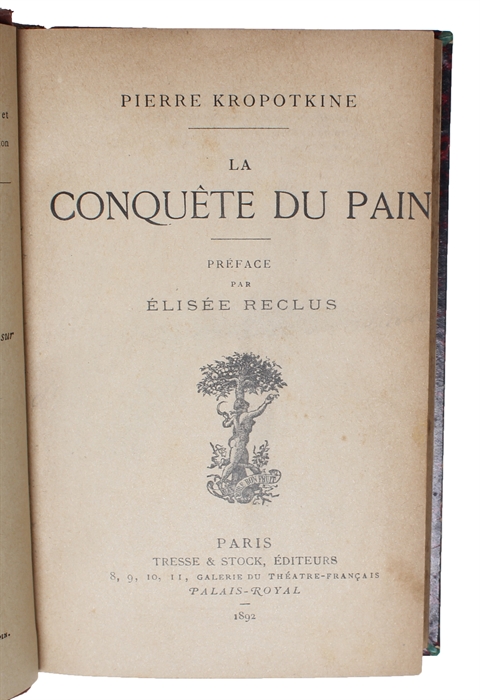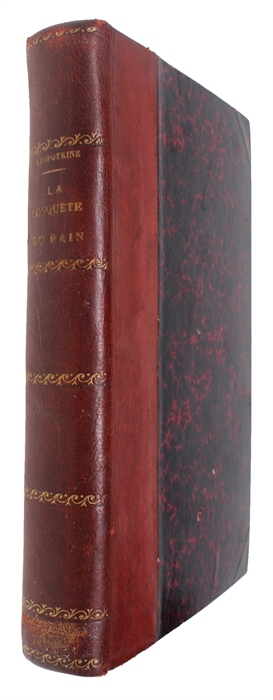FOUNDING MODERN ANARCHISM
KROPOTKINE, PIERRE (PETER KROOPOTKIN).
La conquête du pain. Préface par Élisée Reclus.
Paris, Tresse & Stock, 1892.
8vo. Contemporary red half calf with lovely gilt ornamentation to spine and gilt library-lettering to bottom of spine. Spine slightly soiled. Binder's stamp to front free end-paper. Evenly browned throughout. Title-page closely shaven at outer margin, but not affecting print. XV, (1), 297, (1) pp. + (1, contents) f.
The very rare first edition of Kropotkin's main work, "The Conquest of Bread", the great constructivist work of the libertarian tradition and the greatest modern work of anarchism.
By 1880, Kropotkin had broken with the Bakunist idea of remuneration for labour in the post-revolutionary society. While Bakunin and the Federalist wing of the First International suggested a period of economic transition between Capitalism and Libertarian Communism, Kropotkin believed it necessary to leap from one to the other, from day one of the revolution. Any retention of the wages system in whatever form, such as labour cheques or time coupons, would only result in further exploitation and injustice. The revolution has to consist in the belief that all things are the common inheritance of humanity and should also be held in common; therefore, Kropotkin states in his magnum opus, collectivists merely tinker with the wages system in stead of destroying it, and the only way forward is to get rid of it completely.
Kroptkin's groundbreaking "The Conquest of Bread" constitutes a work of anarcho-communist economics and history rather than a mere text book on revolutionary organization.
"[I]n "The Conquest of Bread", [h]e doesn't seem to see anarchism as a political ideology on a par with, say Marxism, but rather he sees it as a constantly present tendency within human groups. Anarchism, then, is more of an anthropological category than a political one for Kropotkin... He highlights events from the French revolution where associations of labourers sprang up to till the soil together. He looks at aspects of Russian and Swiss peasant communal land use as well as the English lifeboat crews who voluntarily aid seamen in distress. This is where Kropotkin's real worth is - in the field of history and ethics. Of course some of his historical conclusions can be criticised: medieval cities were not as democratic and peaceful as he would have us believe. But he did illuminate an aspect of human history which had been completely neglected. Academics of the nineteenth century were heavily under the influence of neo-Darwinist ideas which sought to justify both capitalism and imperialism. Kropotkin was one of the very first to attempt to refute the 'survival of the fittest' idea. The basic point that humanity has made most progress under conditions of co-operation runs through the length and breadth of "The Conquest of Bread".
The book contains much of interest for present day libertarians. Kropotkin touches on "integral education", agricultural production in cities, international trade, the decentralisation of industry and much else of importance currently. It is, to reiterate, one of the great constructivist anarchist works". (Gary Heyter, A Review of Kropotkin's "The Conquest of Bread").
Prince Pyotr Alexeyevich Kropotkin (1842 -1921) was a Russian activist, scientist, and philosopher, who advocated decentralized government and anarchism. Kropotkin was a proponent of a communist society free from central government and based on voluntary associations between workers. He wrote many books, pamphlets and articles, the most prominent being his groundbreaking "The Conquest of Bread" from 1892. He also contributed the article on anarchism to the Encyclopædia Britannica Eleventh Edition.
"The Conquest Of Bread" first appeared in Paris in 1892, after having been serialized in the anarchist journals "La Révolté" and "Le Révolte". After the appearance of the book, it became extremely influential and was serialized again, though only in part, between 1892 and 1894 in the London journal "Freedom". It quickly reached an extremely large audience and was translated an reprinted numerous times. It was translated into Norwegian already in 1898, and in Japanese in 1909.
"The Conquest of bread" came to play an enormous role in the modern development of anarchism and is the most significant modern work of the libertarian tradition.
Order-nr.: 57460


